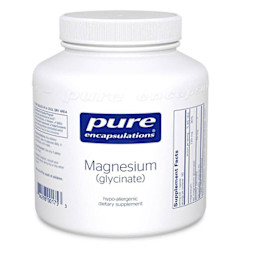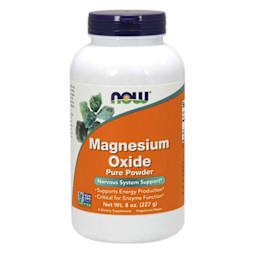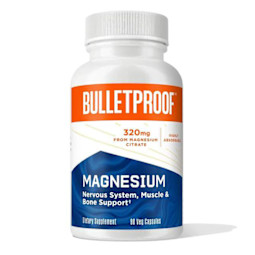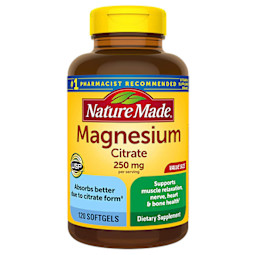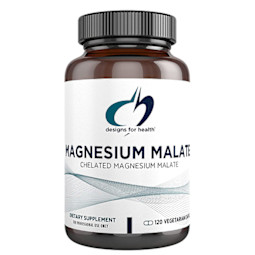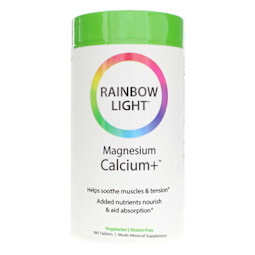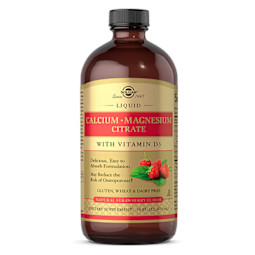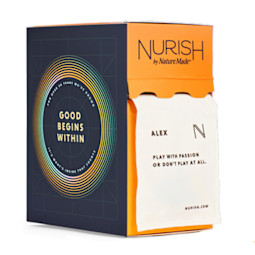Quick list: The best magnesium supplements
Around 600 processes in the body rely on magnesium to run smoothly, making it one important mineral. Magnesium plays a big role in energy production, bone development, and muscle contraction, and it's vital for brain, heart, muscle, and skeletal health (nearly 60% of our body's magnesium1 is stored in the bones and teeth!).*
The mineral is also a building block for life on earth, so we're surrounded by it at all times. It's in our water sources, the ground beneath our feet, and our vegetables, nuts, seeds, whole grains, fruits, fish, and meat. However, a large proportion of the population in Western countries2 doesn't get the recommended amount of magnesium from diet alone, due in part to dietary choices and also the way conventional agriculture strips soil (and therefore, food) of certain minerals.
Almost half (44%) of Americans don't get enough magnesium 3from their diet alone. Taking a magnesium supplement is a helpful way to ensure you reach the recommended daily intake of magnesium—420 mg for men and 320 mg for women—so that your body has one of the essential mineral tools it needs to function at its best.
However, not all magnesium supplements are created equal. Here's how to choose the right one for you.
How to choose a magnesium supplement
Once you’ve determined what type of magnesium supplement is best for you and your needs, it’s time to shop around to find a product that ticks the following boxes:
- High bioavailability: First and foremost, if you're taking any magnesium supplement regularly, you'll want to make sure it's gentle on the stomach. Generally, the higher the bioavailability, the better for daily use.
- Manageable format: Depending on its design, you may need to take three or four capsules of a magnesium supplement daily. Some people won’t mind this, while others will find it a hassle and want to look for more manageable serving sizes.
- Reasonable price: You'll notice that the price point of magnesium supplements varies widely. While basic (stand-alone) magnesium supplements are relatively affordable, pricier ones will contain other nutrients or botanicals for a more well-rounded, functionally efficacious blend. Any premium supplement should feature high-quality, clean ingredients and ideally be free of GMOs, gluten, dairy, soy, and major food allergens whenever possible.
- Safe dosing: Finally, unless otherwise specified by your doctor, you'll want to look for a supplement that falls near or below the tolerable upper intake level for supplemental magnesium, 350 mg410, to minimize the potential for unwanted side effects. For clinical reasons (in partnership with your healthcare practitioner), higher doses may indeed be warranted.
The following supplements are the cream of the magnesium crop: They deliver science-backed doses of magnesium in convenient forms, without unnecessary fillers or additives.
The best magnesium supplements of 2023
Pros
- Increase deep sleep, total sleep time, and sleep efficiency*
- Formulated without melatonin (it can mess with your hormones)
- Highly absorbable, gentle magnesium form
- Non-drowsy
Cons
- Not formulated for children
Magnesium type:
Magnesium bisglycinateForm:
CapsuleDose:
2 capsules dailyDietary:
VeganSoy-freeNon-GMOGluten-freeMelatonin-freeDairy-freeEnvironmental impact:
Sustainably packagedmindbodygreen's highly absorbable magnesium supplement is formulated to help promote that deep, restorative sleep so many of us are missing. In addition to 120 mg of magnesium bisglycinate, each serving contains jujube seed extract, a botanical used in Traditional Chinese medicine for calming and sedation, and PharmaGABA®, a neurotransmitter clinically shown to enhance natural sleep quality. So beyond serving up the magnesium your body needs, two capsules of this vegan, GMO-free, gluten-free, dairy-free, and soy-free product in the evening (with or without food) can deliver the sleep it craves.* Plus, save 10% on your first order with promo code MBG10.
Pros
- Supports cardiometabolic, neurocognitive and musculoskeletal health*
- Formulated with most absorbable form of magnesium (glycinate)
Magnesium type:
Magnesium bisglycinateForm:
CapsuleDose:
1 capsule dailyDietary:
Non-GMOGluten-freeHypoallergenicEnvironmental impact:
N/AEach one of Pure's capsules contains 120 mg of highly absorbable magnesium glycinate, wrapped in a vegetarian capsule. They can be taken at any time of day with food, and are a good way to support healthy magnesium levels.*
Pros
- Supports cellular energy production*
Cons
- Not for children
- Plastic packaging
Magnesium type:
Magnesium oxideForm:
PowderDose:
1/4 tsp dailyDietary:
VeganVegetarianSoy-freeGluten-freeDairy-freeEgg-freeNut-freeKeto-friendlyKosherEnvironmental impact:
N/ANOW Food's supplement powder contains a super short ingredient list: Magnesium oxide, that's it! This pure formula is also non-GMO, vegan, and gluten- and dairy-free, delivering just what you need to increase daily magnesium intake—and nothing else. To keep the tummy happy, it's recommended to dissolve each serving (290 mg magnesium) in at least 6 oz. of cold water or clear liquid.*
Pros
- Supports nervous system*
- Provides bone and muscle support*
Cons
- 3 capsule serving size
- Plastic packaging
Magnesium type:
Magnesium citrateForm:
CapsuleDose:
3 capsules dailyDietary:
Soy-freeGluten-freeDairy-freeEnvironmental impact:
N/AYou'll find 320 mg of magnesium citrate in every serving of Bulletproof's option (3 capsules, which can be taken all at once or divided throughout the day). Soy- and dye-free, this is another solid option for supporting healthy magnesium levels daily.*
Pros
- Supports muscle relaxation, heart, nerve, and bone health*
- No artificial sweeteners, flavors, or synthetic dyes
Magnesium type:
Magnesium citrateForm:
GummyDose:
2 gummies dailyDietary:
Soy-freeGluten-freeDairy-freeEnvironmental impact:
N/AIf you're going to get your daily magnesium fix in a confectionary supplement form, make it these gummies from Nature Made: They're free of artificial flavors, synthetic dyes, high fructose corn syrup, and artificial sweeteners. Each serving of two gummies tastes like a fruit treat but packs 200 mg of absorbable magnesium citrate.*
Pros
- Supports cellular energy & muscle relaxation*
Cons
- Not suitable for vegans
- Plastic packaging
Magnesium type:
Magnesium citrateForm:
SoftgelDose:
2 softgels dailyDietary:
Soy-freeGluten-freeEnvironmental impact:
N/AIn addition to helping maintain healthy levels of magnesium, this daily supplement from Nature Made may help make it easier to pass stool, thanks to the way it helps pulls fluid into the intestines. Free of synthetic dyes and artificial flavors, each serving (250 mg of magnesium citrate) should be taken with a meal for optimum absorption.*
Pros
- Promotes energy production and muscle health*
- Sustainably packaged
Cons
- Not formulated for children
Magnesium type:
Magnesium malateForm:
CapsuleDose:
2 capsules dailyDietary:
VeganVegetarianSoy-freeNon-GMOGluten-freeDairy-freeEnvironmental impact:
N/AVegetarian-friendly, non-GMO, and free of gluten, dairy, and soy, Designs for Health's magnesium supplement is a clean way to reap the benefits of malate, like healthy energy levels and muscle support. Two capsules pack 360 mg of magnesium malate, and they can be taken any time of day, preferably with a meal.*
Pros
- Helps soothe muscles and tension*
- Promotes healthy bones and teeth*
- Supports digestion*
Cons
- Long list of “Other ingredients”
- Plastic packaging
Magnesium type:
Magnesium oxideForm:
TabletDose:
1 tablet dailyDietary:
VegetarianSoy-freeGluten-freeDairy-freeNut-freeSugar-freeWheat-freeEnvironmental impact:
N/ADesigned for athletes, this Rainbow Light Formula replenishes the body with the calcium that might be lost during a tough workout, as well as a combination of magnesium sources to support healthy muscles and bones. Each vegetarian tablet is capped off with vitamins and a modest blend of botanicals that support digestion (spirulina, ginger) and muscle health (meadowsweet extract, turmeric extract, and rosemary leaf essential oil).*
Pros
- Supports a healthy immune system*
- Support strong bones and teeth*
- Promotes nerve and muscle health*
Cons
- 1 gram of added sugar
- Must be refrigerated after opening
Magnesium type:
Magnesium citrateForm:
LiquidDose:
1 tsp dailyDietary:
Soy-freeNon-GMOGluten-freeDairy-freeKosherEnvironmental impact:
Sustainably packagedAnother liquid option, Solgar's magnesium citrate is combined with two other essential nutrients, vitamin D3 and calcium (also in the citrate form), to further support those bones and joints. The added vitamin D can also help promote a healthy immune system. Take 1 tablespoon of the fruity brew (note: it does contain added fruit sugar, aka fructose) daily with a meal, and each bottle should last you about a month.*
Pros
- Supports bone and muscle health/function*
Cons
- 3 tablet serving size
- Long list of “Other ingredients”
Magnesium type:
Magnesium citrateForm:
TabletDose:
3 tablets dailyDietary:
Non-GMOGluten-freeEnvironmental impact:
Sustainably packagedThis powerful combination of vitamin D3, calcium, phosphorus, and multiple forms of magnesium (including chelates) is geared towards enhanced bone strength. To support bone density and muscle function, take three tablets once daily.*
Pros
- Formulated for pregnant women and women who are trying to become pregnant
- Supports development of baby’s brain, nervous system, bones, and eyes*
Cons
- Not suitable for vegans
- Plastic packaging
Magnesium type:
Magnesium oxideForm:
SoftgelDose:
1 softgel dailyDietary:
Gluten-freeEnvironmental impact:
N/AThis well-rounded prenatal multivitamin/mineral supplement from Nurish contains 18 unique vitamins and minerals (including magnesium oxide), plus marine-derived omega-3s EPA and DHA to give women who are pregnant or hope to become pregnant the nutrients they need daily.*
Best for cognitive health: Life Extension Neuro-Mag® Magnesium L-Threonate
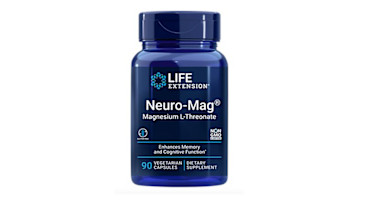
Pros
- Supports healthy cognitive function*
- Promotes healthy brain cell signaling pathways*
Cons
- 3 capsule serving size
- Plastic packaging
Magnesium type:
Magnesium L-threonateForm:
CapsuleDose:
3 capsules dailyDietary:
VegetarianNon-GMOGluten-freeEnvironmental impact:
N/AIn addition to all it does for the body, magnesium is essential for the brain, too. This supplement from Life Extension is tailored to a healthy memory and cognitive function, thanks to its magnesium L-threonate, a relatively new form of magnesium that has been shown to be readily absorbed by the brain in some studies. In three capsules, you receive 2,000 mg of the Mg L-threonate, which delivers 144 mg of elemental magnesium.*
How we chose
Purity
Purity is a sign of quality, so we looked for magnesium supplements that are free of binders, preservatives, and artificial colors or flavors.
Innovation
While these supplements all feature magnesium, some stack it with other active ingredients for added benefits like deeper sleep, sharper focus, and healthier bones.*
Format
If you're taking a supplement daily, you'll want to make sure it's easy to work into your routine. For this reason, we feature a variety of different supplement formats, from capsules and tablets to powders and liquids.
Sustainability
Our list features a number of products made with sustainably in mind. We prioritize brands that use recyclable and reusable packaging and responsibly sourced ingredients.
The most common types of magnesium in supplements
From glycinate to citrate, chloride to oxide, malate, and more, there are many types of magnesium supplements available. Like all minerals, magnesium is delivered as a complex, paired with another compound that assists with delivery. These secondary, helper organic compounds (e.g., glycine amino acid, citric acid, etc.) can also have health benefits of their own.*
Here are some common forms of magnesium found in supplements, and their benefits:
- Magnesium bisglycinate: The combination of magnesium and two glycine amino acids, magnesium bisglycinate (also sometimes called magnesium glycinate) is one of the most bioavailable forms of magnesium. The combination is easy for the body to absorb, making it gentle on the stomach and GI tract. There are some other forms of magnesium, which we'll cover below, that are taken specifically to get the bowels moving at high doses. This is not Mg glycinate's primary design (although all forms of magnesium support digestive motility to some degree). Instead, the amino acid glycine shows the most promise in helping promote high-quality sleep5, making a nightly magnesium bisglycinate supplement a good choice for healthy magnesium levels and a more restful slumber.*
- Magnesium chloride: Magnesium chloride, a blend of magnesium and chlorine, can be extracted from brine or seawater. It has a relatively high bioavailability and is a solid supplement to take if you're just looking to boost your dietary intake of magnesium.*
- Magnesium citrate: A combination of magnesium oxide and citric acid, magnesium citrate can help promote healthy bowel movements.* Since it also has a relatively high bioavailability, it, too, can be used as a daily magnesium supplement in the right dose. This form of magnesium dissolves readily in water, making it a popular pick for magnesium powders and liquids.
- Magnesium oxide: The most common (and least expensive) form of magnesium, this one is formed by combining magnesium and oxygen ions. This simple form has a lower absorption rate and is most often taken to encourage bowel movements6 and act as a helpful buffer for other magnesium forms.*
- Magnesium malate: Together, magnesium and malic acid are relatively bioavailable and seem to stick around in the bloodstream7 for longer than some other forms of magnesium. There is also some anecdotal evidence magnesium malate can promote muscle comfort, but clinical results are mixed8.*
- Magnesium sulfate: The magnesium and sulfate pairing can be used to replenish electrolytes and encourage bowel movements,* and it's often found in supplements and other remedies like Epsom salts. (Fun fact: The man who brought magnesium to Western medicine was said to be a farmer working in Epsom, England, who noticed that the salts in his well water had soothing effects on his cattle9.) These days, many people take Epsom salt baths to soothe muscles, though there isn't much research to back this up.
Summary
Frequently asked questions
What are the benefits of magnesium?
Since the body naturally uses magnesium for so many functions, getting enough magnesium on a daily basis can bring a slew of benefits. These are some of the best perks, but we cover the benefits of different types of magnesium in more detail here.
Promotes healthy blood pressure*
Promotes healthy blood sugar levels*
Promotes heart health*
Promotes bone health*
Helps support a healthy inflammatory response*
Promotes deeper and more restorative rest (if magnesium bisglycinate)*
How much should I take?
Birth to 6 months: 30 mg/day
7 to 12 months: 75 mg/day
1 to 3 years: 80 mg/day
4 to 8 years: 130 mg/day
9 to 13 years: 240 mg/day
14 to 18 years: females: 360 mg/day; males: 410 mg/day
19 to 30 years: females: 310 mg/day; males: 400 mg/day
31 years and up: females 320 mg/day; males: 420 mg/day
19 to 30 years: pregnant: 350 mg/day; lactating: 310 mg/day
31 to 50 years: pregnant: 360 mg/day; lactating: 320 mg/day
What are the risks and potential side effects?
Magnesium is an extremely safe (and essential!) mineral found in our diet and environment.
While every individual's nutrition needs and response are unique, the most common, potential side effects of magnesium supplements (particularly at higher doses, especially if you're not used to taking magnesium) are loose stools, upset stomach, and GI discomfort.
Taking a more gentle and bioavailable magnesium supplement helps avoid these unpleasantries. Starting low and going slow, building up to the best magnesium dose for you personally, can also help limit potential side effects.
Magnesium supplements have the potential to interfere with certain heart (e.g., blood pressure) medications and antibiotics, so you should always consult your doctor before adding a new supplement to your routine.
The takeaway
Magnesium is an essential mineral that many people don't get enough of from food alone. That's no surprise since the daily requirements for this macromineral are quite high.
Adding a high-quality supplement to your routine is one way to ensure that your body has adequate levels of magnesium each day.
Combine yours with a healthy, whole-food diet for added assurance that you're giving your body the nutrients it needs.
Editor's Note: This article was originally published on October 9, 2021, and has been updated overtime. A previous version of this article contained an incorrect link for a product. The current publication date reflects the correct link.
Meet The Experts
9 Sources
- https://www.ncbi.nlm.nih.gov/pmc/articles/PMC6316205/
- https://www.ncbi.nlm.nih.gov/pmc/articles/PMC5926493/
- https://www.ncbi.nlm.nih.gov/pmc/articles/PMC6686054/
- https://ods.od.nih.gov/factsheets/Magnesium-Consumer/
- https://pubmed.ncbi.nlm.nih.gov/22293292/
- https://www.ncbi.nlm.nih.gov/pmc/articles/PMC7911806/
- https://pubmed.ncbi.nlm.nih.gov/29679349/
- https://pubmed.ncbi.nlm.nih.gov/31150373/
- https://www.ncbi.nlm.nih.gov/pmc/articles/PMC1584988/



